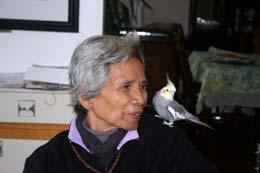Sex slave brings her ordeal to Canada

One of the last living survivors of sexual slavery by the Japanese military during the Second World War brought her message to Canada when she spoke to more than a thousand students this week promoting human rights for women against wartime rape and human trafficking.
Lola Fidencia David, 86, is visiting Canada along with Cristina Lope Rosello, a Filipina therapist who helps former “comfort women” deal with the trauma of their past.
She’s one of the last living survivors of sexual slavery during the Second World War and now her harrowing story will become part of the oral histories collection at the Winnipeg-based Canadian Museum for Human Rights (CMHR)
David, 86, was just 14 years old when she was captured and repeatedly raped by the Japanese military.
In 2007, Lola testified at Canada’s House of Commons, which passed a unanimous motion urging the Japanese government to take full responsibility and offer a formal apology to the estimated 200,000 so-called comfort women of Korea, China, The Philippines and other nations.
David, along with her translator and Filipina therapist, Cristina Lope Rosello, are in Winnipeg to record their stories at the CMHR.
During World War II the Japanese Army forced over 200,000 women from across Asia into a military sexual slavery system; the victims are euphemistically known as ‘comfort women’. Without receiving an official apology from the Japanese government, survivors are still waiting for justice.
Lola Fidencia David, 87, will be visiting from the Philippines. Lola Fidencia was 14 when she was forced into the garrison and repeatedly raped by Japanese soldiers. In November 2007, she testified in the Canadian House of Commons, which led to the unanimous passing of a motion urging the Japanese government to take full responsibility for this violation and offer a formal apology.
Meanwhile, a news report said Japan shied away from investigating the “comfort women” issue in Southeast Asia in the early 1990s to stem negative public attention that was sure to arise from the contentious issue,
That secret refusal came despite a pledge publicly to launch probes into countries in addition to South Korea, the Asahi Shimbun has learned from classified diplomatic papers and interviews with government officials.
In 1992 and 1993, the comfort women issue emerged as a sticking point between Japan and South Korea. In July 1993, the government conducted a round of interviews with former comfort women in South Korea.
However, according to a confidential diplomatic document dated July 30, 1993, Foreign Minister Kabun Muto stated the Japanese government’s policy that it would not conduct interviews with former comfort women in the Philippines, Indonesia and Malaysia.
“We want to avoid (interviews) as much as possible also from the viewpoint that we should ward off a situation in that we only end up fanning public interest (in the issue) unnecessarily,” Muto said in the document telegraphed to the Japanese embassies in the three countries.
Comfort women refer to women who were forced to work in front-line brothels to provide sex to Japanese troops before and during World War II. Many of them were from the Korean Peninsula, which was a Japanese colony from 1910 to 1945.
The Asahi Shimbun obtained those diplomatic documents through the information disclosure law.
Leave a comment






